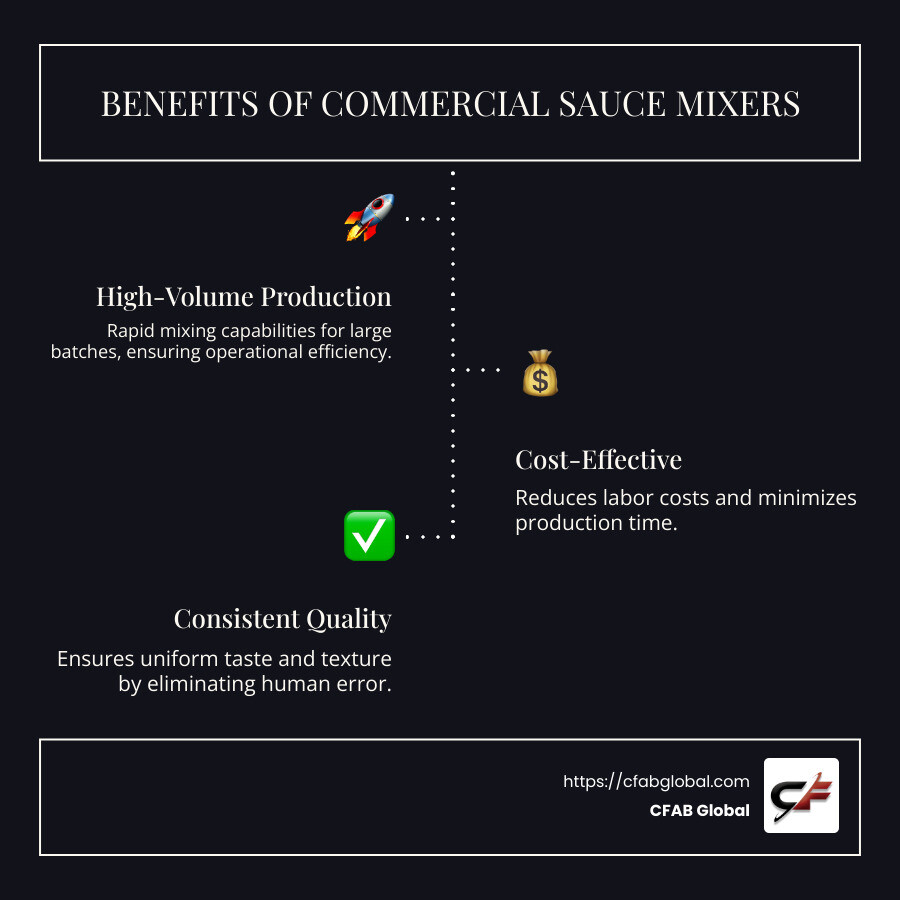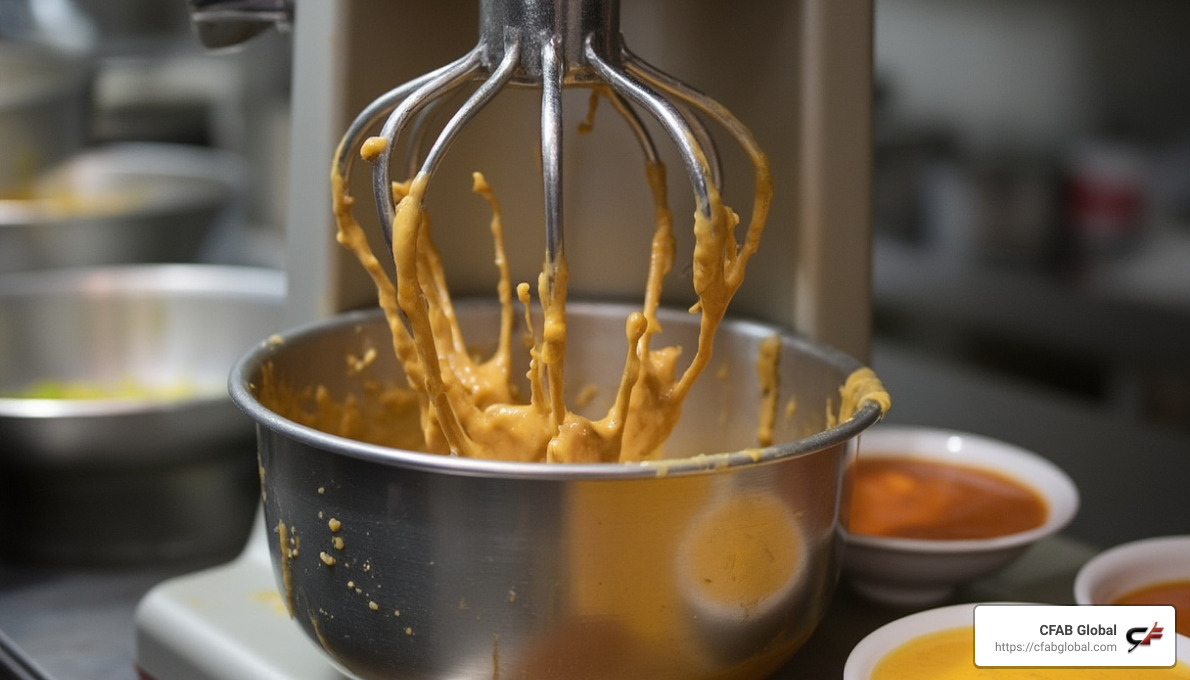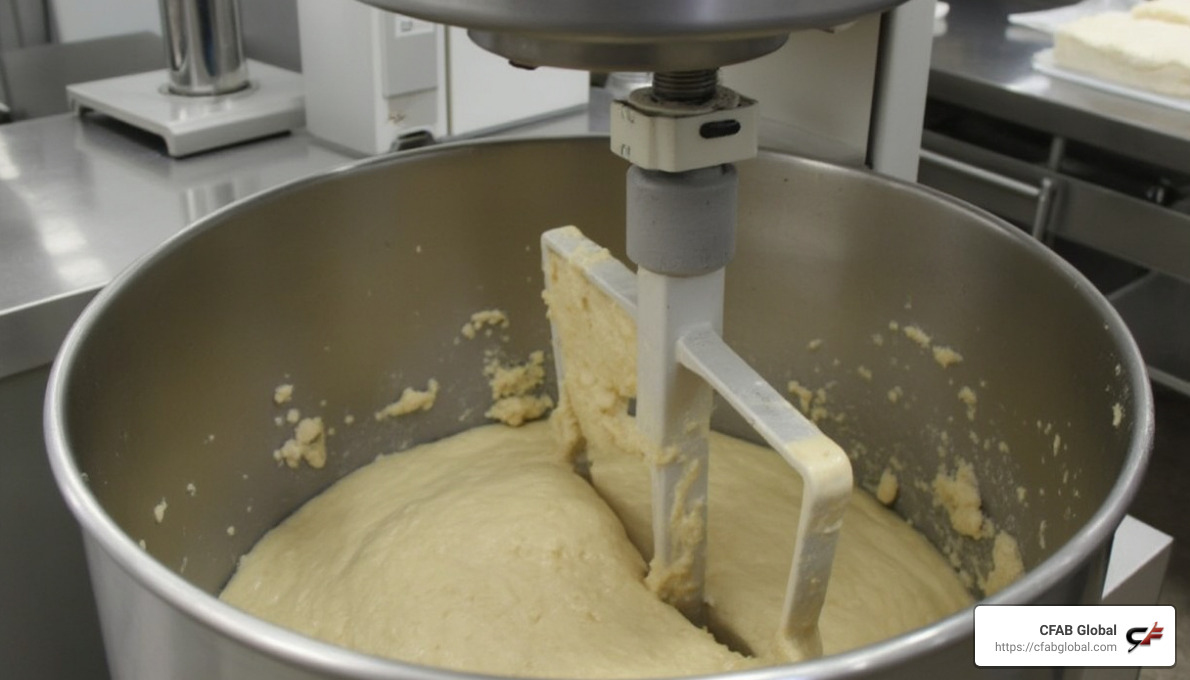Mastering Sauce Production with Commercial Sauce Mixers
Commercial sauce mixer—an essential tool in today’s food production industry. These machines are designed to efficiently blend sauces, dressings, and other liquid or semi-liquid products, speeding up production, saving money, and ensuring consistency in taste and texture. Here’s what you need to know at a glance:
- Rapid mixing for high-volume production
- Cost-effective by saving time and reducing labor
- Versatility in handling different types of sauces
- Reliable and consistent blending results
The demands of bulk sauce production require precision and speed. Businesses from large-scale food manufacturing plants to busy restaurant kitchens rely on commercial mixers to meet these challenges. These machines not only boost operational efficiency but also improve the quality of the final product by eliminating human error and ensuring uniformity. As a result, companies can keep up with market demands without compromising on quality.
I’m Todd Cleppe, and I bring over 25 years of experience in the machinery industry, specializing in improving operational efficiencies in food production settings, particularly with commercial sauce mixers. I’ve worked on changing equipment to minimize downtime and improve performance to support businesses in excelling at their production goals.

Let’s explore what makes these mixers a key component in successful sauce production, driving both flavor consistency and business efficiency forward.
Understanding Commercial Sauce Mixers
When it comes to commercial sauce mixers, the technology behind them is crucial for achieving the perfect sauce consistency and meeting production requirements. These mixers are designed to handle a variety of sauces, whether you’re crafting a delicate dressing or a robust barbecue sauce. Let’s explore the different types of commercial sauce mixers and the key features you should consider when choosing one.
Types of Commercial Sauce Mixers
Planetary Mixers
These mixers are known for their versatility. They have a mixing head that moves around a stationary bowl, similar to how planets orbit the sun. This motion ensures every part of the sauce gets mixed thoroughly, making them ideal for a wide range of applications, from sauces to doughs.
Spiral Mixers
Primarily used for dough, these mixers feature a spiral-shaped agitator that rotates in a circular bowl. They mimic the kneading action of hands, providing a gentle mix that’s perfect for thick, dough-like sauces or when a specific texture is required.
Vertical Mixers
These mixers are typically used in beverage and snack food production. They feature a vertical shaft with mixing blades that rotate in a single direction, ideal for liquid-based products like juices or sauces that need thorough blending.
Horizontal Mixers
Often found in meat processing plants or bakeries, horizontal mixers use paddles rotating in a horizontal plane. They’re effective for mixing heavy doughs and sauces that require a specific consistency.
Key Features to Consider
When selecting a commercial sauce mixer, several features can make a significant difference in performance and efficiency:
Motor Power
The motor is the heart of the mixer. A powerful motor ensures that the mixer can handle large volumes and thick mixtures without overheating or breaking down. Consider the motor’s horsepower and how it aligns with your production needs.
Capacity
Mixers come in various sizes, from small units for artisanal production to large machines for industrial use. Choose a capacity that matches your production volume to avoid overworking the machine or underutilizing its potential.
Material Durability
Durability is key, especially in a high-demand kitchen environment. Look for mixers made with robust, food-grade materials like stainless steel, which are easy to clean and resistant to corrosion.
Hygiene Standards
Maintaining hygiene is paramount in food production. Opt for mixers that meet or exceed industry hygiene standards, ensuring they are easy to clean and maintain. This not only protects your product but also complies with health regulations.
Selecting the right commercial sauce mixer involves understanding both the technical aspects and the specific needs of your production process. By focusing on these key features, you can ensure your mixer will be a valuable asset in maintaining consistency and efficiency in your sauce production.
Top Commercial Sauce Mixer Applications
When it comes to the food industry, commercial sauce mixers play a pivotal role in ensuring efficient sauce production and bulk processing. These mixers are not just about mixing; they’re about changing raw ingredients into perfectly blended sauces that meet high standards. Let’s explore how these mixers fit into two major applications: beverage and snack food production, and meat processing and bakeries.
Beverage and Snack Food Production
In the world of beverage and snack food production, time and consistency are everything. Vertical sauce mixers are often the go-to choice here. These mixers feature a vertical shaft with strategically placed mixing blades that rotate in a single direction. This design is perfect for liquid blending, ensuring thorough and uniform mixing of ingredients like juices, dressings, and sauces.

Vertical mixers are ideal for creating smooth, homogeneous products. They help in maintaining the desired texture and flavor, which is crucial for meeting consumer expectations. Whether you’re producing a refreshing juice or a savory sauce, these mixers can handle the task efficiently.
Meat Processing and Bakeries
In meat processing plants and bakeries, the demands are different. Here, horizontal mixers are often preferred. These mixers use paddles rotating in a horizontal plane, making them effective for mixing heavy doughs and thick sauces. The horizontal design allows for consistent mixing of ingredients, which is essential for achieving the right texture and consistency in products like marinades or dough-based sauces.

In bakeries, horizontal mixers shine by handling large batches of dough, ensuring even distribution of ingredients. This is particularly important for products that require a specific consistency, like bread or pastry doughs. In meat processing, they help in mixing spices and other ingredients into ground meats, ensuring a uniform flavor profile.
Both vertical and horizontal mixers are designed to meet the high demands of commercial production. They reduce labor costs, minimize human error, and increase efficiency, making them indispensable tools in the food industry. By choosing the right type of mixer for your specific application, you can ensure consistent product quality and streamline your production process.
Selecting the Right Commercial Sauce Mixer
Choosing the right commercial sauce mixer for your business is all about understanding your specific needs. Consider factors like production volume, sauce viscosity, and ingredient handling. These elements will guide you in finding a mixer that fits seamlessly into your operations.
Customization Options
Every sauce recipe is unique, and so are the requirements for mixing it. That’s why customization is key. Whether you need capacity adjustments or additional functionalities, many suppliers offer options to tailor the mixer to your needs. For example, you might want a mixer with multiple speed settings to handle both thin and thick sauces efficiently.
The ability to customize your mixer ensures that it can adapt to your specific production needs, whether you’re making a delicate vinaigrette or a hearty marinara. This flexibility can lead to better product quality and more efficient production processes.
Local Service and Support
When investing in a commercial sauce mixer, it’s crucial to consider the availability of local service and support. Maintenance services are vital for keeping your equipment running smoothly and minimizing downtime. Look for suppliers who offer comprehensive support, including online assistance and on-site maintenance.
Local suppliers can be a great asset. They understand the local market conditions and can provide timely support when needed. This can be especially important if your mixer requires specific maintenance or parts that are not readily available.
Having access to reliable support ensures that your mixer remains in top condition, which is essential for maintaining consistent production quality. By partnering with a supplier that offers strong local service, you can focus on what you do best—creating delicious sauces.
Selecting the right commercial sauce mixer involves careful consideration of your production needs and the support available to you. By making informed choices, you can improve your production capabilities and ensure your sauces meet the highest standards.
Frequently Asked Questions about Commercial Sauce Mixers
What are the main types of commercial sauce mixers?
Commercial sauce mixers come in several types, each designed for specific tasks and sauce consistencies:
-
Planetary Mixers: These mixers have a central shaft that moves the mixing attachment in an orbital motion, much like the planets orbit the sun. They are versatile and perfect for sauces that require thorough mixing. Their design allows for even blending, ideal for both thin and thick sauces.
-
Spiral Mixers: Primarily used for dough, spiral mixers can also handle thicker sauces. They have a rotating bowl and a spiral hook that moves through the sauce, ensuring consistent mixing. This type is excellent for sauces that need a gentle but thorough blend.
-
Vertical Mixers: These are often used in beverage and snack food production. With a vertical shaft and mixing blades, they are perfect for liquid-based products. Vertical mixers ensure that ingredients are evenly distributed throughout the sauce.
-
Horizontal Mixers: Common in meat processing and bakeries, horizontal mixers use paddles rotating in a horizontal plane. They are powerful and efficient, making them suitable for dense sauces or mixtures that require substantial mixing force.
How do I choose the right mixer for my business?
Selecting the right commercial sauce mixer involves considering several key factors:
-
Motor Power: The motor determines how effectively the mixer can handle different sauce viscosities. A powerful motor is essential for thick or heavy sauces, while a less powerful motor may suffice for lighter, liquid-based sauces.
-
Capacity: Consider the volume of sauce you need to produce. Mixers come in various sizes, from small batch mixers to large industrial models. Choose a capacity that aligns with your production needs to ensure efficiency and avoid overworking the equipment.
-
Material: Durability and hygiene are paramount in food production. Look for mixers made with food-grade materials like stainless steel, which is easy to clean and resistant to corrosion. This ensures compliance with health standards and longevity of the equipment.
What industries benefit most from commercial sauce mixers?
Several industries rely heavily on commercial sauce mixers to improve their production processes:
-
Food Production: Whether for preparing sauces, dressings, or marinades, commercial mixers are indispensable in food manufacturing. They ensure consistency and quality, crucial for maintaining product standards.
-
Catering Services: For caterers who need to produce sauces in bulk, commercial mixers offer efficiency and speed, reducing preparation time and labor costs.
-
Manufacturing: In large-scale food manufacturing, these mixers are vital for blending ingredients consistently. They help streamline operations and maintain uniformity across large batches, crucial for meeting consumer expectations.
By understanding the different types of mixers and the factors that influence your choice, you can select the right equipment to optimize your production process. This ensures you can meet the demands of your industry while maintaining high-quality standards.
Conclusion
Choosing the right commercial sauce mixer is crucial for any business in the food industry aiming to boost operational efficiency. At CFAB Global, we understand the unique challenges and demands of sauce production. Our comprehensive solutions, including the Machine Reliability Program, are designed to improve the performance and lifespan of your equipment, ensuring you get the most out of your investment.
Operational Efficiency is at the heart of what we do. Our custom approach ensures that your machinery operates at peak performance, minimizing downtime and maximizing productivity. By partnering with CFAB Global, you gain access to expert guidance and cutting-edge equipment that meets the highest hygiene and durability standards.
Our Machine Reliability Program is not just about maintaining your machinery; it’s about optimizing your entire production process. We work closely with you to develop a customized strategy that addresses your specific needs, helping you achieve measurable improvements in efficiency and product quality.
For those in the food industry, investing in a high-quality commercial sauce mixer is a step towards ensuring consistent product quality and meeting customer demands. With CFAB Global by your side, you can focus on what you do best—creating delicious sauces—while we take care of the machinery that makes it all possible.
Explore our Food Manufacturing Equipment List to find how our solutions can transform your production process and drive your business forward.






